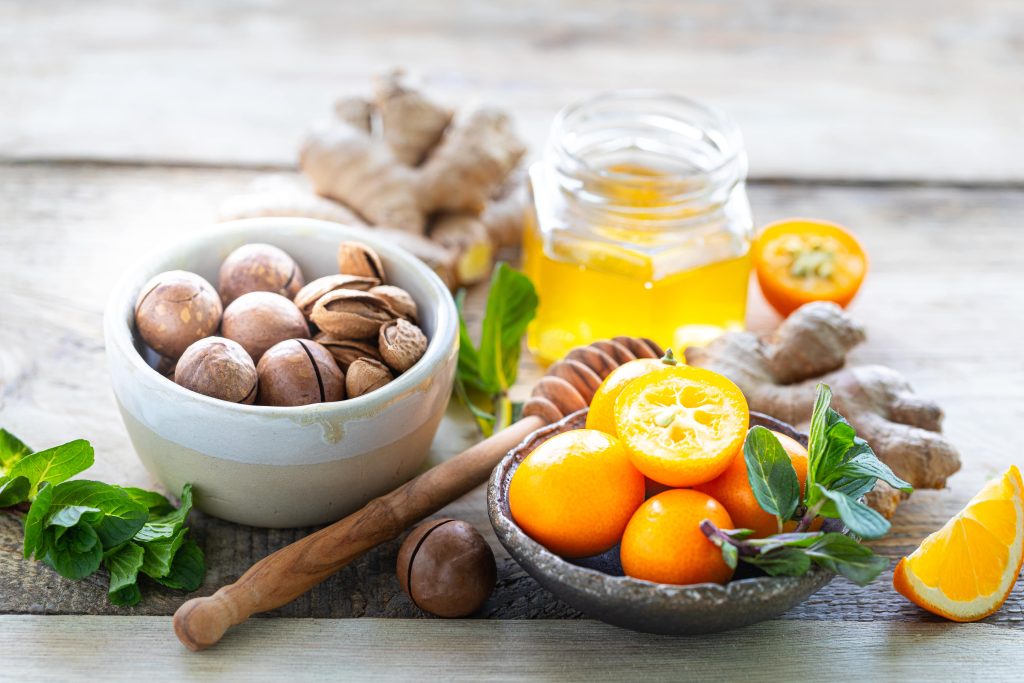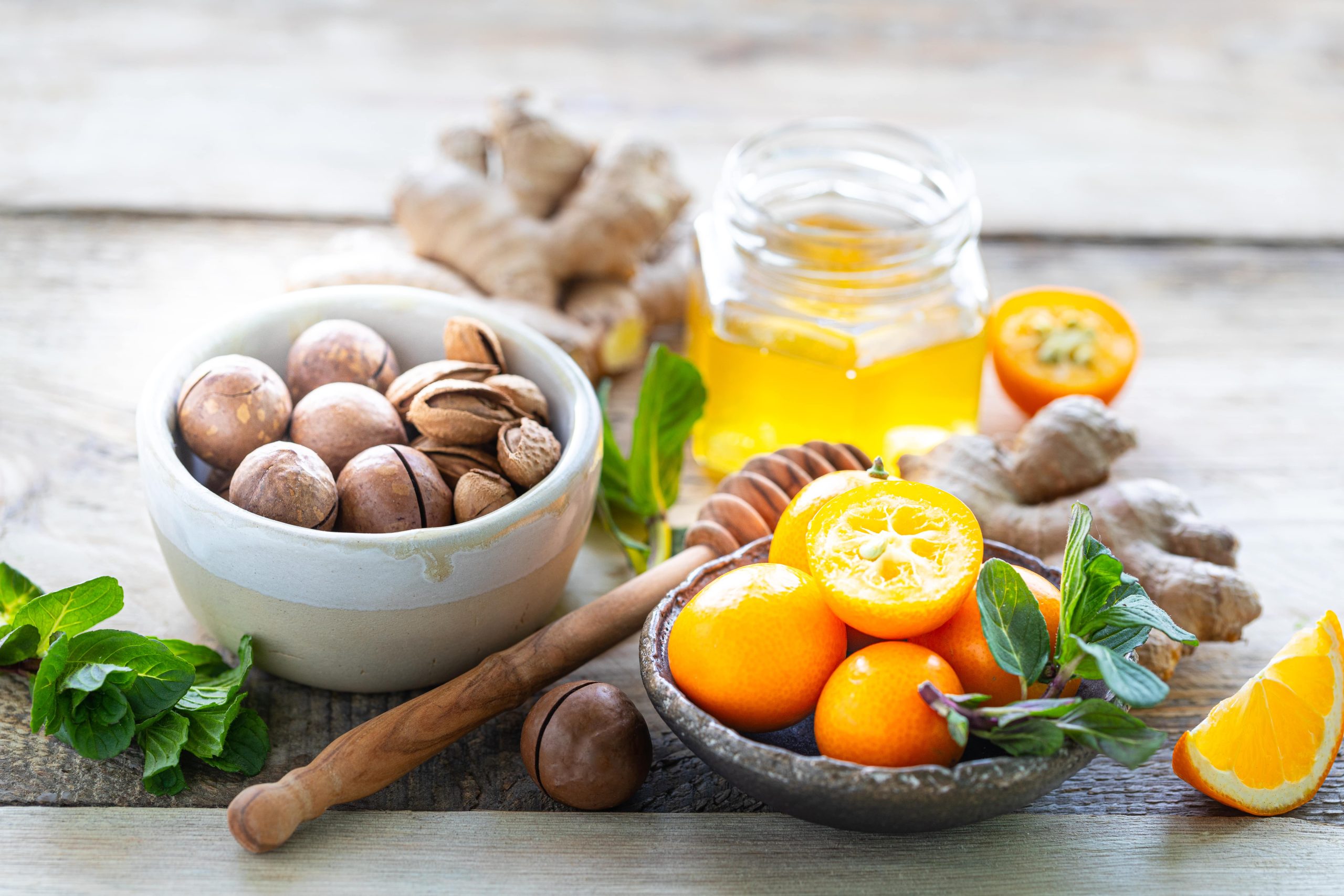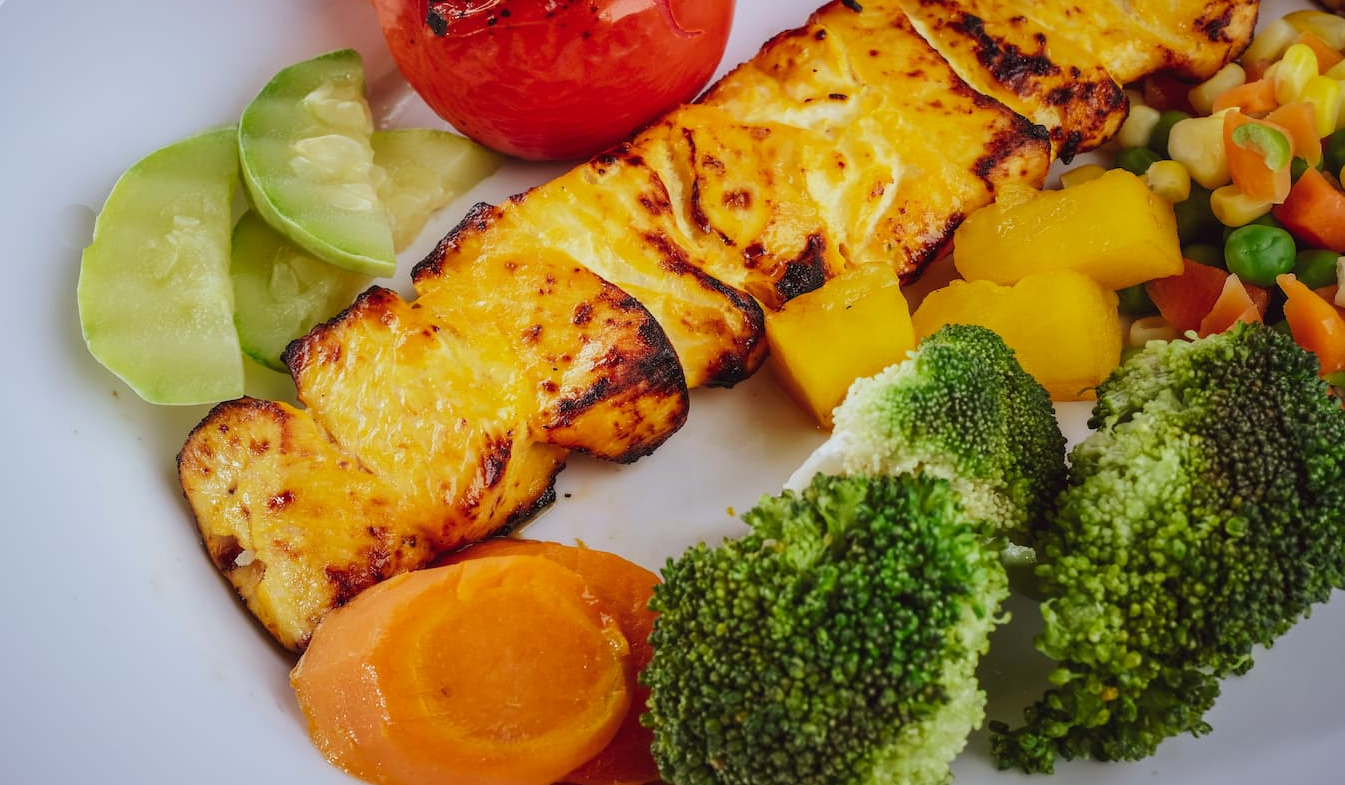Maintaining a strong and healthy immune system is essential to protect us against various illnesses and our overall well-being. Although lifestyle factors such as exercise and sleep quality play a significant role, a diet rich in immune-boosting foods can provide the necessary nutrients to support our immune system.
Furthermore, with the abundance of information available online, it’s understandable that people can feel overwhelmed when it comes to keeping their immune systems healthy. Fortunately, we have created a comprehensive list of the top 10 scientifically proven foods that enhance our immune systems.
Ten foods for a healthy immune system

Don’t worry, we’ve not gone abstract with this list, all of the foods included can be picked up at any supermarket!
1Citrus fruits
Oranges, lemons, and grapefruits contain high levels of vitamin C. This is of particular importance as this vitamin plays a significant role in fighting infection by helping to produce white blood cells. And because the human body doesn’t produce or store vitamin C the recommended daily intake (RDA) for men, and women is 90 mg and 75 mg, respectively. Thankfully, almost all citrus fruits are high in vitamin C, so there’s a wide variety to choose from.
2Berries
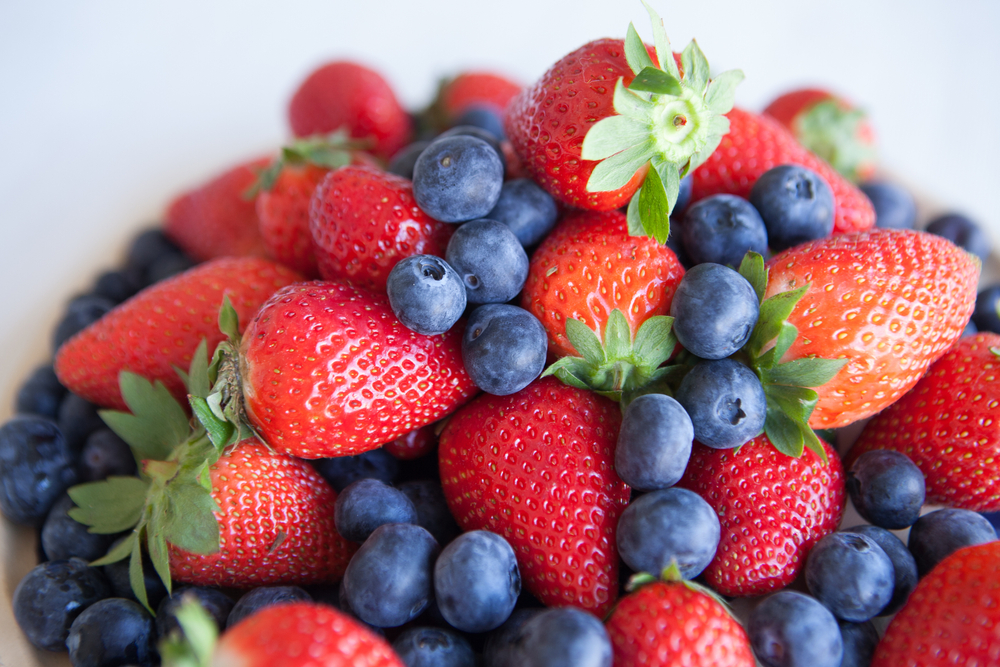
Strawberries, blueberries, and raspberries are packed with polyphenols, which are linked to countering cell damage and interacting with our gut bacteria to reduce inflammation and enhance immune response.
In addition, a study found that flavonoids found in berries play an essential role in the respiratory tract’s immune defence system. The results show that people who consume foods rich in flavonoids are less likely to get an upper respiratory tract infection or common cold than those who did not.
3Garlic
Found in almost every cuisine across the world, garlic has been used for centuries due to its medicinal properties. In fact, garlic’s ability to fight off infections and diseases is likely due to it containing a heavy concentration of sulfur-containing compounds, such as allicin.
A study investigating the effectiveness of garlic supplements that contain allicin in reducing the risk of getting a cold yielded promising results. However, further research is needed to form a more definitive conclusion.
4Ginger
Used in a variety of dishes and desserts, as well as in teas, ginger is perhaps best well-known for its anti-inflammatory and antioxidant properties. Although acute inflammation is a necessary part of a normal immune response, chronic inflammation can cause damage to the immune system. Ginger also contains a high concentration of gingerol, a phytochemical that can enhance the production of certain immune factors, such as cytokines, which play a vital role in immune regulation and coordination.
5Nuts & seeds
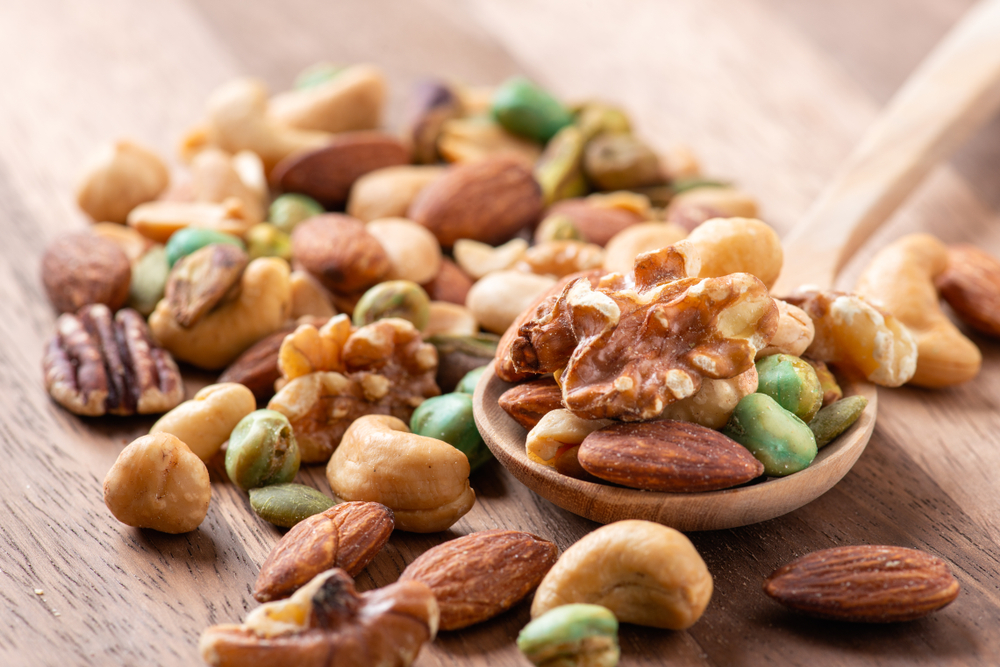
Whether it’s almonds or sunflower seeds, nuts and seeds are prime sources of vitamin E, which is crucial for maintaining a healthy immune system. This is because vitamin E is a natural antioxidant that helps fight free radicals, protecting cells from damage. Adults only need about 15 mg of vitamin E per day.
What’s more, a half-cup serving of almonds provides around 100% of the RDA. Nuts and seeds are also rich in zinc, a mineral involved with the production of antibodies and the healing of wounds.
6Spinach
The nutrient-dense leafy green vegetable spinach provides vitamins and minerals essential for immune function. Most notably vitamins A and C, beta-carotene, and antioxidants. We’ve already covered the effectiveness of vitamin C under citrus fruits but vitamin A also plays a crucial role for immune health. This special vitamin is involved in the development of the immune system and plays regulatory roles in cellular immune responses such as antibody production.
7Yoghurt
Fermented foods such as yoghurt contain probiotics that support a healthy gut microbiome. Interestingly, the gut microbiome plays a crucial role in immune function by acting as a barrier against harmful pathogens.
Meanwhile, having a diverse and balanced gut flora enhances the immune system. It’s important to consume yoghurts that have the phrase ‘live and active cultures’ printed on the label, for example, Greek yoghurt. Yoghurt can also be a great source of vitamin D, which helps to regulate the immune system and is thought to boost our body’s natural defences against diseases.
8Green tea
Tea is rich in catechins, which possess antiviral and antibacterial properties by inhibiting the growth and activity of certain viruses and bacteria, including those responsible for common infections such as influenza.
Green tea is also packed with flavonoids, such as epigallocatechin gallate (EGCG), a type of antioxidant that contains anti-inflammatory properties. Therefore, by reducing inflammation, green tea supports a healthier immune response and helps maintain immune system balance.
9Turmeric
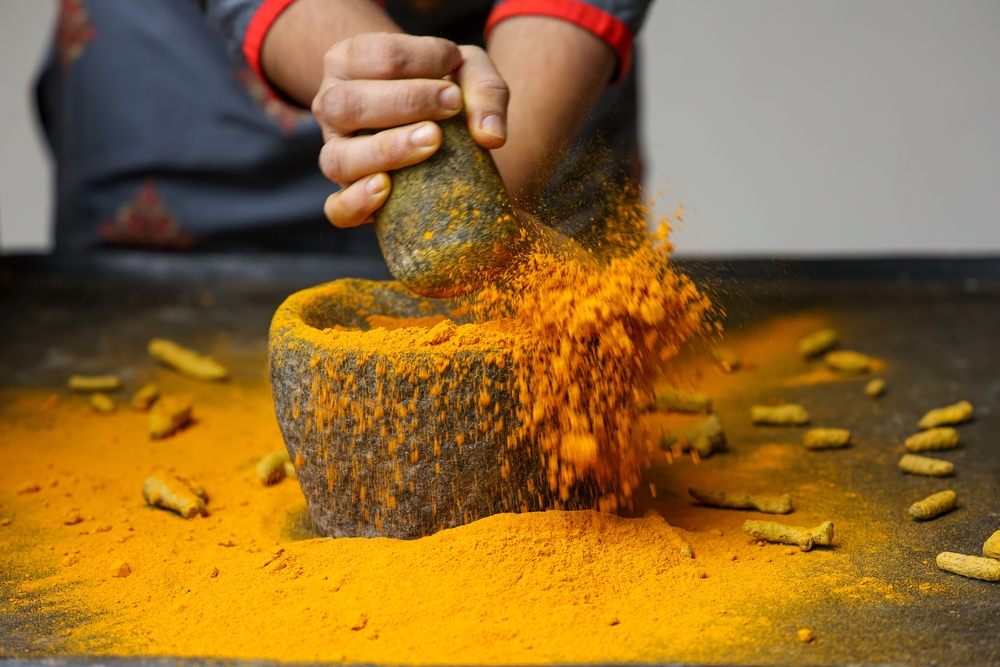
Widely known as a key component in many curries, the bright yellow, bitter spice contains a special anti-inflammatory called curcumin. Curcumin helps regulate the activity of immune cells, such as T cells, B cells, and macrophages.
Additionally, the production and activity of these cells are essential for fighting off pathogens and maintaining immune system balance. It’s important to highlight that the body can experience difficulty absorbing curcumin. Therefore, it’s advised to mix with black pepper or consume it alongside healthy fats to enhance absorption.
10Poultry
Chicken and turkey are high in vitamin B6, which supports the production of red and white blood cells, enhances antibody response, and promotes the proper functioning of various immune cells. Approximately 85 g of chicken or turkey meat contains nearly ⅓ of the RDA. Additionally, not only is poultry a good source of vitamin B6 but also niacin (vitamin B3). Niacin plays an essential role in supporting immune function by maintaining the integrity of the skin and mucous membranes, which act as barriers against pathogens.
What is the best way to incorporate these foods?

Eating more healthily doesn’t automatically mean a dull or restrictive diet. By making marginal changes to our diet, we can make a significant and lasting impact on our overall health and well-being. Struggling to know where to begin? Here are 4 practical tips to help get started:
1Meal plan
Put some time aside to plan out meals in advance. Having a plan in place can prevent impulsive, unhealthy food choices, whilst making grocery shopping easier in the long run.
2Balanced eating
Forget the idea of strict diets. Excessively restrictive diets can lead to compulsive eating problems. Instead, focus on nourishing the body with well-balanced meals throughout the day. By providing the human body with a combination of essential macro and micronutrients, it contains the appropriate resources to carry out its functions properly.
3Discover new recipes
Make your meals exciting and diverse by exploring new recipes that incorporate nutritious ingredients. Look for creative ways to include the foods you enjoy while incorporating healthier alternatives. What’s more, experimenting with different flavours and cooking techniques can make healthy eating an enjoyable experience.
4Eat the rainbow
Introduce a variety of fruits, vegetables, lean proteins, and whole grains into your daily routine. By incorporating new and wholesome foods, you can expand your nutrient intake and discover new favourites.

Curious facts about the immune system
-
The immune system is always active, even when you’re sleeping. It constantly patrols the body, identifying and eliminating potential threats.
-
Sneezing is a response from the immune system. It helps expel irritants, such as dust or pollen, from the respiratory system, preventing them from entering deeper into the body.
-
The immune system has its own memory. This allows it to respond more efficiently if the same pathogen enters the body again in the future. For example, vaccines work by stimulating the immune system to recognise and remember specific pathogens.
Let’s summarise

Enhancing our immune system’s strength through a well-balanced diet is essential when it comes to maintaining optimal health and protection against illnesses. The top 10 foods highlighted in this article offer a range of nutrients, antioxidants, and immune-boosting properties. Furthermore, making small but meaningful changes to our eating habits doesn’t have to be boring or restrictive.
However, it’s important to highlight that a healthy diet alone is not enough, and it should be paired with other lifestyle factors such as regular exercise, sufficient sleep, and stress management for optimal immune health, for the best results.
Not enough? Here is more from our colleagues
Dr. Berg is a chiropractor who specializes in Healthy Ketosis & Intermittent Fasting. In this video, he explains the notion of immune system and shares tips on how you can bulletproof your immune system.

